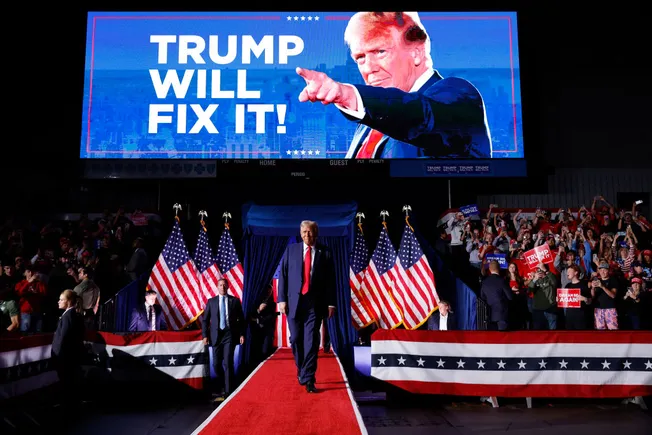Patrick E. Murphy is a former Florida congressman, current CIO at Coastal Construction and CEO of Togal.ai, both headquartered in Miami. Opinions are the author’s own.
As a Democrat and former congressman, I wasn’t thrilled with the outcome of the presidential election. But as a leader in construction, I see real potential in how the Trump administration could support builders and stimulate the economy.
Some unexpected silver linings are emerging.

Patrick E. Murphy
Permission granted by Patrick Murphy
For instance, last week’s announcement that Elon Musk and Vivek Ramaswamy will lead a new Department of Government Efficiency could be promising news for an industry riddled with red tape. Their aim to cut bureaucracy and streamline regulatory processes could bring meaningful improvements, especially in speeding up compliance checks and offering grants to help localities invest in technology to fast-track permitting.
The reality is stark: 81% of developers report delays due to slow permitting approvals, a bottleneck that directly impacts the housing market. If excessive regulations and backlogged permits prevent new construction, we simply cannot address the housing shortage.
With the nation in need of 4.5 million additional homes, it’s time for the building industry and government agencies to innovate and accelerate the path to breaking ground.
Incentivizing new construction
One of the biggest challenges in construction is navigating local and state zoning rules, which are often outdated and no longer serve the needs of the community. Initiatives by leaders like Musk and Ramaswamy could help incentivize local and state governments to update zoning rules and approve more building plans.
The Trump administration could incentivize cities with funding in exchange for pro-growth policies, such as easing zoning restrictions, permitting taller and more dense buildings, and pushing back against NIMBY opposition.
We’ve seen one example of these policies in action in Florida: The “Live Local Act” allows developers who include affordable apartments in their projects to build more than zoning laws allow. It’s prompting a rush of applications for more density. This successful policy could serve as a model nationally to address the housing crisis.
Add all that up — in concert with more liquidity, growth in crypto and lower corporate taxes — and we could see banks lending more freely to developers, creating new opportunities to address the affordable housing crisis.
A push for innovation
With Musk’s experience in tech, I’m hopeful he will unleash the power of artificial intelligence on government functions that can be completed more quickly and better with technology.
AI could help automate building code, fire and life safety and extensive environmental review approvals, allowing governments and contractors to shorten construction timelines. It could also help spot design issues early, reducing costly rework. Rework costs U.S. firms over $177 billion annually and can account for up to 20% of a project’s total cost.
I don’t know if we want to live in a world without any AI guardrails, but if Musk takes most of the shackles off, innovation and efficiencies will flourish.
This will also require buy-in from construction companies as well, so the success of any Musk/Ramaswamy initiatives will also depend on their ability to get our notoriously stubborn industry to embrace technology.
Fewer than 4% of U.S. construction companies currently use AI, but it represents the best opportunity for us to address our bottlenecks and unlock faster, more efficient project completions.
Leadership that understands construction
While Musk has certainly become a controversial figure, he understands the labor shortages, delays and obstacles we face in building major projects.
His track record with Tesla, Starlink and The Boring Co. demonstrates an understanding for large-scale projects and innovation. I’m hopeful he will push the construction industry to innovate as well, to overcome challenges like talent shortages and jobsite safety.
We are at the precipice of AI, robotics, new materials and automation massively disrupting construction and real estate abroad. These changes will not only reduce costs, but will dramatically reduce construction timelines.
My personal experience with these enhancements suggests they are leading to more durable, stronger, faster, less expensive and greener construction. Having leadership who understands our industry will help move innovation forward.
Business-friendly policies
With Republican control across the White House and both chambers of Congress, the thing most of us in corporate America feel best about, with regards to a second Trump term, is that business growth will be a priority.
Tax policy will play a large role. The core of his tax plan includes an extension of his 2017 tax cuts and his campaign proposal to lower the corporate tax rate even lower, from 21% down to 15%.
Most business leaders I speak to — regardless of whether they supported Trump — are cautiously optimistic about the impact of a unified government that has long prioritized private sector growth. The promise of clear, consistent policy has so far been reassuring to the markets — in particular for sectors like real estate, finance and technology.
Concerns for construction?
Trump’s campaign pledges weren’t without concern for the construction industry: potential tariffs and immigration policy. I hope Trump’s rhetoric on these issues remains just that — political talk — because such policies would hurt the construction industry’s bottom line.
His proposed tariffs — 60% on Chinese goods and 10 to 20% on imports from other countries — could increase building material costs, blowing up our budgets and bringing many jobs to a halt.
This isn’t the first time we’ve seen it. When Trump raised tariffs on lumber, aluminum and steel, material costs soared in 2018, driving up home prices and further straining affordability, so let’s learn from the past and avoid repeating this mistake.
The construction industry could face a major setback if the Trump administration moves forward with mass deportations. Reduced immigration during his previous term led to labor shortages, driving up wages and building costs. With around half a million job vacancies in construction, this ongoing shortage is already slowing projects at a time when we urgently need faster, more affordable building solutions.
Instead of deporting those willing to stay and work, we should advocate for policies that allow them to obtain documentation, contribute taxes and support our economy. Our industry is already stretched thin, and we need to focus on expanding — not contracting — our workforce.
Looking ahead
As someone who supported Vice President Kamala Harris, I understand the concerns surrounding this administration. But as an optimist — and an American — I see a unique opportunity for Trump to shape his legacy by fostering a stronger, more inclusive economy.
If he and his administration streamline regulations, incentivize building and address other construction industry challenges, the potential impact on housing, job growth and economic stability could be transformative.
With a unified Congress behind him, President-elect Donald Trump has a rare chance to follow through on his campaign promises and take concrete steps forward to help America build stronger and faster.

